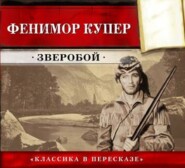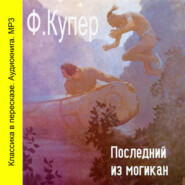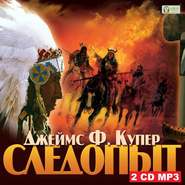По всем вопросам обращайтесь на: info@litportal.ru
(©) 2003-2024.
✖
The Spy: Condensed for use in schools
Настройки чтения
Размер шрифта
Высота строк
Поля
The peddler dropped the folds of the great-coat that concealed his features, and gazed for a moment earnestly at the face of the speaker; then, dropping his head upon his bosom, he said, meekly:
“If it be your excellency’s pleasure.”
“It is necessary. Since I have filled the station which I now hold, it has become my duty to know many men who, like yourself, have been my instruments in procuring intelligence. You have I trusted more than all; I early saw in you a regard to truth and principle that, I am pleased to say, has never deceived me. You alone know my secret agents in the city, and on your fidelity depend, not only their fortunes, but their lives.”
He paused, as if to reflect in order that full justice might be done to the peddler, and then continued:
“I believe you are one of the very few that I have employed who have acted faithfully to our cause; and, while you have passed as a spy of the enemy, have never given intelligence that you were not permitted to divulge. To me, and to me only of all the world, you seem to have acted with strong attachment to the liberties of America.”
During this address, Harvey gradually raised his head from his bosom, until it reached the highest point of elevation; a faint tinge gathered in his cheeks, and, as the officer concluded, it was diffused over his whole countenance in a deep glow, while he stood, proudly swelling with his emotions, but with eyes that modestly sought the feet of the speaker.
“It is now my duty to pay you for these services; hitherto you have postponed receiving your reward, and the debt has become a heavy one. I wish not to undervalue your dangers; here are a hundred doubloons;[134 - a former Spanish coin, worth about $8.] you will remember the poverty of our country, and attribute to it the smallness of your pay.”
The peddler raised his eyes to the countenance of the speaker; but, as the other held forth the money, he moved back, as if refusing the bag.
“It is not much for your services and risks, I acknowledge,” continued the general, “but it is all that I have to offer; at the end of the campaign it may be in my power to increase it.”
“Does your excellency think that I have exposed my life and blasted my character for money?”
“If not for money, what then?”
“What has brought your excellency into the field? For what do you daily and hourly expose your precious life to battle and the halter? What is there about me to mourn, when such men as you risk their all for our country? No, no, no – not a dollar of your gold will I touch; poor America has need of it all.”
The bag dropped from the hand of the officer, and fell at the feet of the peddler, where it lay neglected during the remainder of the interview. The officer looked steadily at the face of his companion, and continued:
“You will soon be old; the prime of your days is already past; what have you to subsist on?”
“These!” said the peddler, stretching forth his hands, that already were embrowned with toil.
“But those may fail you; take enough to secure a support to your age. Remember your risks and care. I have told you that the characters of men who are much esteemed in life depend on your secrecy; what pledge can I give them of your fidelity?”
“Tell them,” said Birch, advancing and unconsciously resting one foot on the bag – “tell them that I would not take the gold!”
The composed features of the officer relaxed into a smile of benevolence, and he grasped the hand of the peddler firmly.
“Now, indeed, I know you; and although the same reasons which have hitherto compelled me to expose your valuable life will still exist, and may prevent my openly asserting your character, in private I can always be your friend. Fail not to apply to me when in want or suffering, and so long as God giveth to me, so long will I freely share with a man who feels so nobly and acts so well. If sickness or want should ever assail you, and peace once more smile upon our efforts, seek the gate of him whom you have so often met as Harper, and he will not blush to acknowledge you in his true character.”
“It is little that I need in this life,” said Harvey; “so long as God gives me health and honest industry, I can never want in this country; but to know that your excellency is my friend, is a blessing that I prize more than all the gold of England’s treasury.”
The officer stood for a few moments in the attitude of intense thought. He then drew to him the desk, and wrote a few lines on a piece of paper, and gave it to the peddler.
“That Providence destines this country to some great and glorious fate I must believe, while I witness the patriotism that pervades the bosoms of her lowliest citizens,” he said. “It must be dreadful to a mind like yours to descend into the grave branded as a foe to liberty; but you already know the lives that would be sacrificed, should your real character be revealed. It is impossible to do you justice now, but I fearlessly entrust you with this certificate; should we never meet again, it may be serviceable to your children.”
“Children!” exclaimed the peddler. “Can I give to a family the infamy of my name?”
The officer gazed at the strong emotion he exhibited with pain, and he made a slight movement towards the gold; but it was arrested by the expression of his companion’s face. Harvey saw the intention, and shook his head, as he continued more mildly:
“It is, indeed, a treasure that your excellency gives me; it is safe, too. There are men living who could say that my life was nothing to me, compared to your secrets. The paper that I told you was lost I swallowed when taken last by the Virginians. It was the only time I ever deceived your excellency, and it shall be the last. Yes, this is, indeed, a treasure to me. Perhaps,” he continued, with a melancholy smile, “it may be known after my death who was my friend; but if it should not, there are none to grieve for me.”
“Remember,” said the officer, with strong emotion, “that in me you will always have a secret friend; but openly I cannot know you.”
“I know it, I know it,” said Birch; “I knew it when I took the service. ’Tis probably the last time that I shall ever see your excellency. May God pour down his choicest blessings on your head!” He paused, and moved towards the door. The officer followed him with eyes that expressed deep interest. Once more the peddler turned, and seemed to gaze on the placid but commanding features of the general with regret and reverence, and then, bowing low, withdrew.
CHAPTER XXIV.
DEATH OF THE SPY. – A REVELATION
It was thirty-three years after the interview which we have just related that an American army was once more arrayed against the troops of England; but the scene was transferred from the banks of the Hudson to those of the Niagara.[135 - name of river and falls between New York and Canada.]
It was the evening of the 25th of July of that bloody year, when two young officers were seen standing on the table-rock, contemplating the great cataract with an interest that seemed to betray that they were gazing for the first time at the wonder of the western world. A profound silence was observed by each, until the companion of the officer suddenly started, and pointing eagerly with his sword into the abyss[136 - bottomless depth.] beneath, exclaimed:
“See, Wharton, there is a man crossing in the very eddies of the cataract, and in a skiff no bigger than an egg-shell.”
“He has a knapsack – it is probably a soldier,” returned the other. “Let us meet him at the ladder, Mason, and learn his tidings.”
Some time was expended in reaching the spot where the adventurer was intercepted. Contrary to the expectations of the young soldiers, he proved to be a man far advanced in life, and evidently no follower of the camp.
A few words of salutation, and, on the part of the young men, of surprise that one so aged should venture so near the whirlpools of the cataract, were exchanged, when the old man inquired, with a voice that began to manifest the tremor of age, the news from the contending armies.
“We whipped the red-coats here the other day, among the grass on the Chippewa[137 - a village in Canada, twenty-one miles northwest of Buffalo.] plains,” said the one who was called Mason.
“Perhaps you have a son among the soldiers,” said his companion, with a milder demeanor,[138 - manner.] and an air of kindness; “if so, tell me his name and regiment, and I will take you to him.”
The old man shook his head, and answered:
“No; I am alone in the world!”
“You should have added, Captain Dunwoodie,” cried his careless comrade, “if you could find either; for nearly half our army has marched down the road, and may be, by this time, under the walls of Fort George,[139 - a fort on the Canada side of the Niagara River, where it flows into Lake Ontario.] for anything that we know to the contrary.”
The old man stopped suddenly, and looked earnestly from one of his companions to the other; the action being observed by the soldiers, they paused also.
“Did I hear right?” the stranger uttered, raising his hand to screen his eyes from the rays of the setting sun. “What did he call you?”
“My name is Wharton Dunwoodie,” replied the youth, smiling.
The stranger motioned silently for him to remove his hat, which the youth did accordingly, and his fair hair blew aside like curls of silk, and opened the whole of his ingenuous countenance to the inspection of the other.
“’Tis like our native land!” exclaimed the old man with vehemence; “improving with time. God has blessed both.”
“Why do you stare thus, Lieutenant Mason?” cried Captain Dunwoodie, laughing a little; “you show more astonishment than when you saw the falls.”
“Oh, the falls! they are a thing to be looked at on a moon-shiny night, by your aunt Sarah and that gay old bachelor, Colonel Singleton.”
“Come, come, Tom, no jokes about my good aunt, I beg; she is kindness itself; and I have heard it whispered that her youth was not altogether happy.”
“Why, as to rumor,” said Mason, “there goes one in Accomac, that Colonel Singleton offers himself to her regularly every Valentine’s Day; and there are some who add that your old great-aunt helps his suit.”
“Aunt Jeanette!” said Dunwoodie, laughing; “dear, good soul, she thinks but little of marriage in any shape, I believe, since the death of Dr. Sitgreaves.”
“If it be your excellency’s pleasure.”
“It is necessary. Since I have filled the station which I now hold, it has become my duty to know many men who, like yourself, have been my instruments in procuring intelligence. You have I trusted more than all; I early saw in you a regard to truth and principle that, I am pleased to say, has never deceived me. You alone know my secret agents in the city, and on your fidelity depend, not only their fortunes, but their lives.”
He paused, as if to reflect in order that full justice might be done to the peddler, and then continued:
“I believe you are one of the very few that I have employed who have acted faithfully to our cause; and, while you have passed as a spy of the enemy, have never given intelligence that you were not permitted to divulge. To me, and to me only of all the world, you seem to have acted with strong attachment to the liberties of America.”
During this address, Harvey gradually raised his head from his bosom, until it reached the highest point of elevation; a faint tinge gathered in his cheeks, and, as the officer concluded, it was diffused over his whole countenance in a deep glow, while he stood, proudly swelling with his emotions, but with eyes that modestly sought the feet of the speaker.
“It is now my duty to pay you for these services; hitherto you have postponed receiving your reward, and the debt has become a heavy one. I wish not to undervalue your dangers; here are a hundred doubloons;[134 - a former Spanish coin, worth about $8.] you will remember the poverty of our country, and attribute to it the smallness of your pay.”
The peddler raised his eyes to the countenance of the speaker; but, as the other held forth the money, he moved back, as if refusing the bag.
“It is not much for your services and risks, I acknowledge,” continued the general, “but it is all that I have to offer; at the end of the campaign it may be in my power to increase it.”
“Does your excellency think that I have exposed my life and blasted my character for money?”
“If not for money, what then?”
“What has brought your excellency into the field? For what do you daily and hourly expose your precious life to battle and the halter? What is there about me to mourn, when such men as you risk their all for our country? No, no, no – not a dollar of your gold will I touch; poor America has need of it all.”
The bag dropped from the hand of the officer, and fell at the feet of the peddler, where it lay neglected during the remainder of the interview. The officer looked steadily at the face of his companion, and continued:
“You will soon be old; the prime of your days is already past; what have you to subsist on?”
“These!” said the peddler, stretching forth his hands, that already were embrowned with toil.
“But those may fail you; take enough to secure a support to your age. Remember your risks and care. I have told you that the characters of men who are much esteemed in life depend on your secrecy; what pledge can I give them of your fidelity?”
“Tell them,” said Birch, advancing and unconsciously resting one foot on the bag – “tell them that I would not take the gold!”
The composed features of the officer relaxed into a smile of benevolence, and he grasped the hand of the peddler firmly.
“Now, indeed, I know you; and although the same reasons which have hitherto compelled me to expose your valuable life will still exist, and may prevent my openly asserting your character, in private I can always be your friend. Fail not to apply to me when in want or suffering, and so long as God giveth to me, so long will I freely share with a man who feels so nobly and acts so well. If sickness or want should ever assail you, and peace once more smile upon our efforts, seek the gate of him whom you have so often met as Harper, and he will not blush to acknowledge you in his true character.”
“It is little that I need in this life,” said Harvey; “so long as God gives me health and honest industry, I can never want in this country; but to know that your excellency is my friend, is a blessing that I prize more than all the gold of England’s treasury.”
The officer stood for a few moments in the attitude of intense thought. He then drew to him the desk, and wrote a few lines on a piece of paper, and gave it to the peddler.
“That Providence destines this country to some great and glorious fate I must believe, while I witness the patriotism that pervades the bosoms of her lowliest citizens,” he said. “It must be dreadful to a mind like yours to descend into the grave branded as a foe to liberty; but you already know the lives that would be sacrificed, should your real character be revealed. It is impossible to do you justice now, but I fearlessly entrust you with this certificate; should we never meet again, it may be serviceable to your children.”
“Children!” exclaimed the peddler. “Can I give to a family the infamy of my name?”
The officer gazed at the strong emotion he exhibited with pain, and he made a slight movement towards the gold; but it was arrested by the expression of his companion’s face. Harvey saw the intention, and shook his head, as he continued more mildly:
“It is, indeed, a treasure that your excellency gives me; it is safe, too. There are men living who could say that my life was nothing to me, compared to your secrets. The paper that I told you was lost I swallowed when taken last by the Virginians. It was the only time I ever deceived your excellency, and it shall be the last. Yes, this is, indeed, a treasure to me. Perhaps,” he continued, with a melancholy smile, “it may be known after my death who was my friend; but if it should not, there are none to grieve for me.”
“Remember,” said the officer, with strong emotion, “that in me you will always have a secret friend; but openly I cannot know you.”
“I know it, I know it,” said Birch; “I knew it when I took the service. ’Tis probably the last time that I shall ever see your excellency. May God pour down his choicest blessings on your head!” He paused, and moved towards the door. The officer followed him with eyes that expressed deep interest. Once more the peddler turned, and seemed to gaze on the placid but commanding features of the general with regret and reverence, and then, bowing low, withdrew.
CHAPTER XXIV.
DEATH OF THE SPY. – A REVELATION
It was thirty-three years after the interview which we have just related that an American army was once more arrayed against the troops of England; but the scene was transferred from the banks of the Hudson to those of the Niagara.[135 - name of river and falls between New York and Canada.]
It was the evening of the 25th of July of that bloody year, when two young officers were seen standing on the table-rock, contemplating the great cataract with an interest that seemed to betray that they were gazing for the first time at the wonder of the western world. A profound silence was observed by each, until the companion of the officer suddenly started, and pointing eagerly with his sword into the abyss[136 - bottomless depth.] beneath, exclaimed:
“See, Wharton, there is a man crossing in the very eddies of the cataract, and in a skiff no bigger than an egg-shell.”
“He has a knapsack – it is probably a soldier,” returned the other. “Let us meet him at the ladder, Mason, and learn his tidings.”
Some time was expended in reaching the spot where the adventurer was intercepted. Contrary to the expectations of the young soldiers, he proved to be a man far advanced in life, and evidently no follower of the camp.
A few words of salutation, and, on the part of the young men, of surprise that one so aged should venture so near the whirlpools of the cataract, were exchanged, when the old man inquired, with a voice that began to manifest the tremor of age, the news from the contending armies.
“We whipped the red-coats here the other day, among the grass on the Chippewa[137 - a village in Canada, twenty-one miles northwest of Buffalo.] plains,” said the one who was called Mason.
“Perhaps you have a son among the soldiers,” said his companion, with a milder demeanor,[138 - manner.] and an air of kindness; “if so, tell me his name and regiment, and I will take you to him.”
The old man shook his head, and answered:
“No; I am alone in the world!”
“You should have added, Captain Dunwoodie,” cried his careless comrade, “if you could find either; for nearly half our army has marched down the road, and may be, by this time, under the walls of Fort George,[139 - a fort on the Canada side of the Niagara River, where it flows into Lake Ontario.] for anything that we know to the contrary.”
The old man stopped suddenly, and looked earnestly from one of his companions to the other; the action being observed by the soldiers, they paused also.
“Did I hear right?” the stranger uttered, raising his hand to screen his eyes from the rays of the setting sun. “What did he call you?”
“My name is Wharton Dunwoodie,” replied the youth, smiling.
The stranger motioned silently for him to remove his hat, which the youth did accordingly, and his fair hair blew aside like curls of silk, and opened the whole of his ingenuous countenance to the inspection of the other.
“’Tis like our native land!” exclaimed the old man with vehemence; “improving with time. God has blessed both.”
“Why do you stare thus, Lieutenant Mason?” cried Captain Dunwoodie, laughing a little; “you show more astonishment than when you saw the falls.”
“Oh, the falls! they are a thing to be looked at on a moon-shiny night, by your aunt Sarah and that gay old bachelor, Colonel Singleton.”
“Come, come, Tom, no jokes about my good aunt, I beg; she is kindness itself; and I have heard it whispered that her youth was not altogether happy.”
“Why, as to rumor,” said Mason, “there goes one in Accomac, that Colonel Singleton offers himself to her regularly every Valentine’s Day; and there are some who add that your old great-aunt helps his suit.”
“Aunt Jeanette!” said Dunwoodie, laughing; “dear, good soul, she thinks but little of marriage in any shape, I believe, since the death of Dr. Sitgreaves.”

















